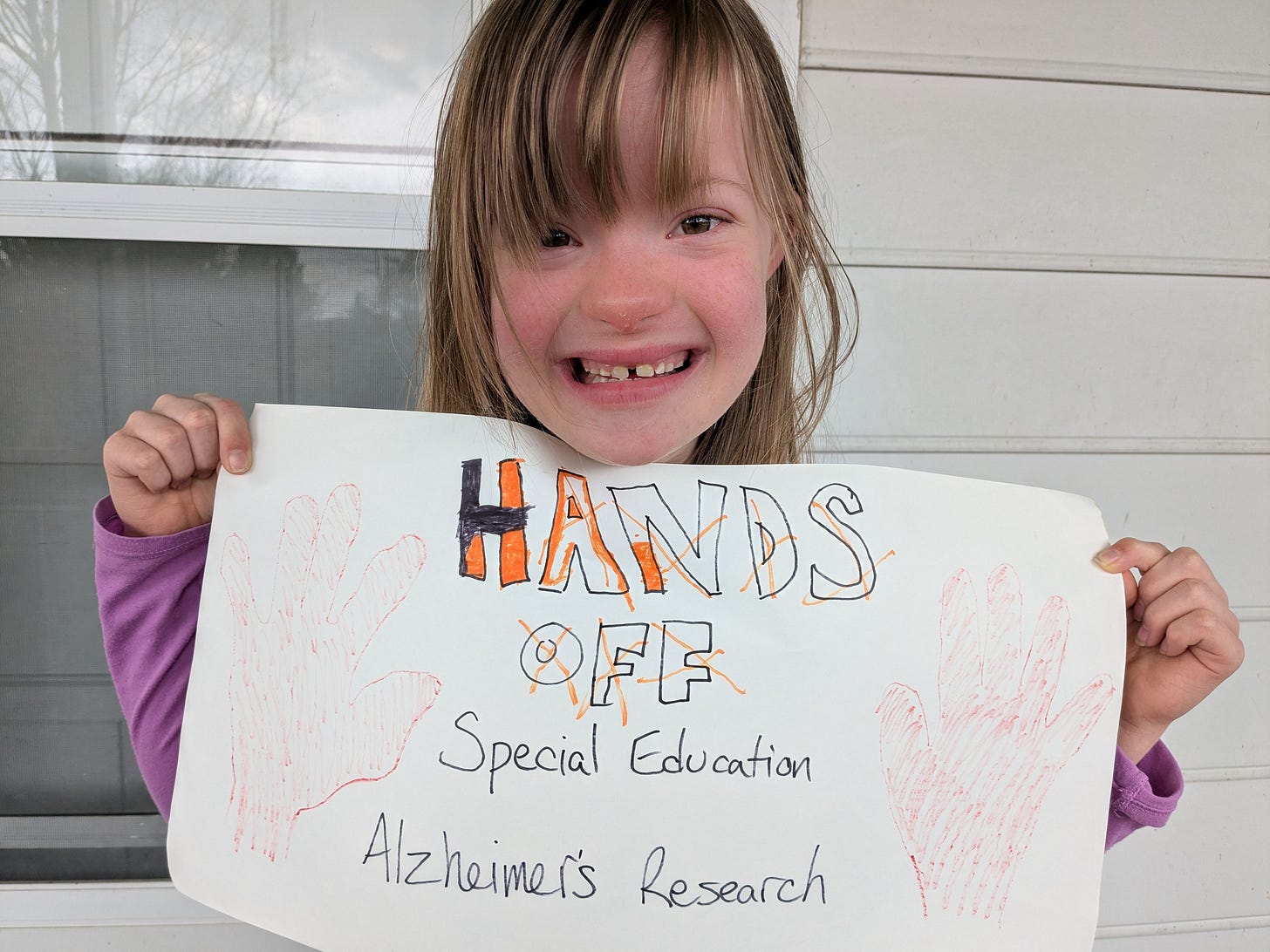My daughter has Down syndrome. Trump is stealing her future.
The true cost of funding cuts at the NIH.
My daughter Sallie is 11 years old. She’s a dancer and would definitely want me to tell you all about her latest dance recital, her tap routine, her sparkly dress, and her red gloves. She has big dreams, too—she recently stole my laptop, applied for a job, and became an honorary employee at Bluey’s World in Brisbane, Australia. And she has Down syndrome.
So obviously, our family is interested in research and development that helps people with Down syndrome. According to the National Institute on Aging, 50 percent of people with Down syndrome will develop Alzheimer's disease sometime in their lifetime. So families like ours are very invested in how discoveries, research, and treatments for Alzheimer's are developing in real time.
Although Sallie learns more slowly, people with Down syndrome have the capacity to continue to learn throughout their lifetimes. She will grow in ability and independence on her own timescale—unless early-onset Alzheimer’s takes that away from her.
There’s been a good case for optimism on this front in recent years. Until recently, there was reason to hope that, by the time Sallie gets to be 30 or 40 years old—when she will be most at risk of developing early-onset Alzheimer's—we would have new treatments available. That’s thanks to the critical work being done by America’s public health apparatus.
Much of the breakthrough research that provides a lifeline for people like Sallie is done by the National Institutes of Health and federally funded institutions like the Alzheimer's Disease Research Centers. These agencies provide funding and research capacity that simply can’t be met in the private sector or by other governments abroad.
And so it was with real regret and fear for Sallie’s future that we learned about deep funding cuts to the NIH that the Trump administration is pursuing, up to 40 percent across the board. The agency’s Center for Alzheimer’s and Related Dementias has already lost its incoming director, a big chunk of its funding, and many employees. This translates to studies being discontinued, and patients being forced to wait for potential lifesaving breakthroughs. It also means Sallie faces a more uncertain future.
Recently, Dr. Charles DeCarli, head of the NIH-funded Alzheimer’s Disease Center at UC Davis, spoke about the massive impact of Trump’s funding cuts on ongoing studies and research projects. This was based on his own experience losing millions in federal funding for a nationwide and potentially lifesaving study of dementia patients. He said:
“First off, certain research projects may never come to fruition [because of these cuts]. They get disrupted, they’re not able to get back on track, and that work doesn’t get done. Second, our participants lose trust in what we’re doing because we’re not able to continue what we’re doing in a reliable manner … Disruptions delay discovery. We would hate to have people succumb to an illness that could have been treated or prevented, had the research continued.”
This is what’s on the line with the Trump funding cuts. Not just for Sallie, but for the millions of Americans who rely on scientific breakthroughs to cure their illnesses and prolong their lives.
And so we very much hope that our leaders will see the light—or that we will elect leaders who are more clear-eyed about these issues. The folks slashing funding see numbers on a page. I see my daughter Sallie’s future hanging in the balance.
Sallie always looks forward to her dance recitals. And we hope that we can look forward to a long, energetic, interesting life for her, filled with opportunities to reach her full potential. We just wish this administration would lend a helping hand, not get in the way.
Kirsten Eve Beachy is a mother and writer living in Virginia.




92% of the people in my demographic voted against him. Going forward, folks need to better influence the votes within their demographics. That's a major way to prevent this nonsense from happening again.
We must continue to fight for the rights of our people and children until these insane monsters have lost and deported far away to a prison where they want to send us!